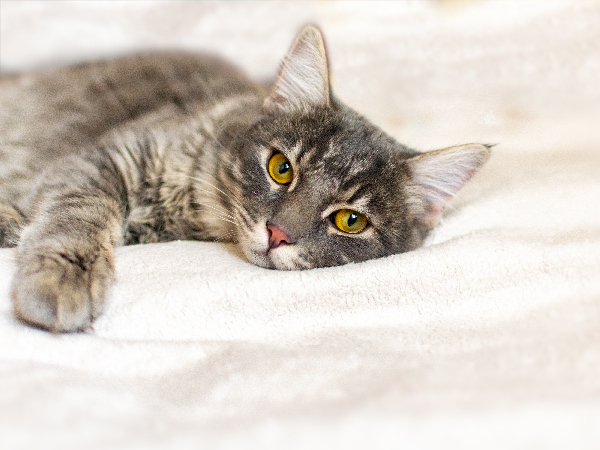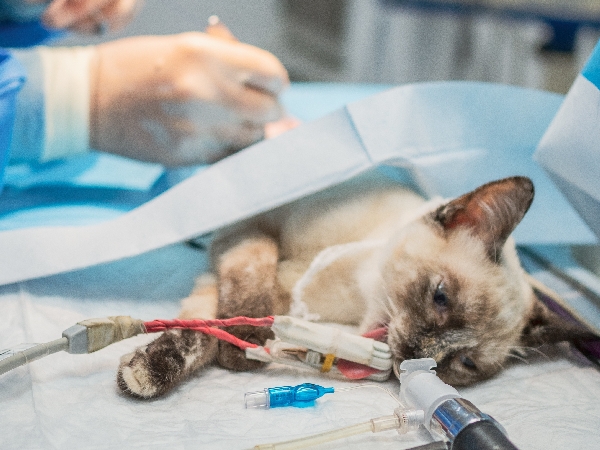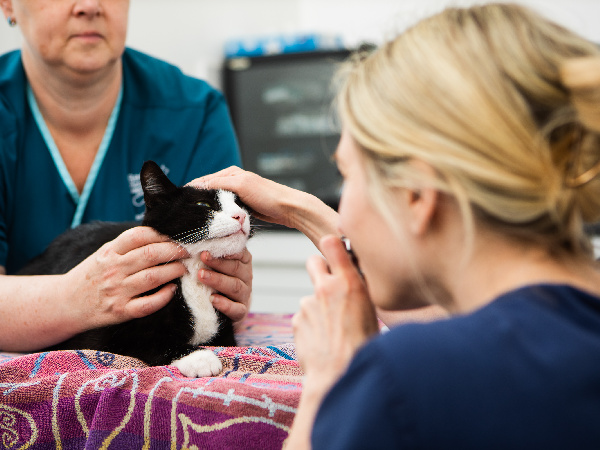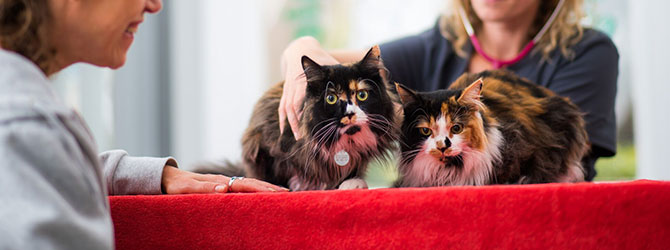Identifying Hyperthyroidism in Cats: A Guide to Thyroid Health Issues
Just like humans, cats can have thyroid issues too. They can either have hyperthyroidism, where their body makes too much of a certain hormone, or sometimes hypothyroidism, where they don't make enough - although this is extremely rare in cats.
Studies show hyperthyroidism is the most common hormonal disorder in cats, it’s usually seen in cats over eight years old, and it’s become more prevalent in recent years.
Brief summary
- Hyperthyroidism is a common hormonal disorder, usually seen in cats over eight years old, and caused by overproduction of thyroid hormones due to benign swelling or rarely malignant thyroid tumour
- The symptoms of hyperthyroidism include weight loss, increased hunger and thirst, increased urination and defecation, hyperactivity, increased vocalisation, and poor coat condition
- Diagnosis is made through a blood test called T4, and treatment can include medication, surgery, radioactive iodine, or a low-iodine diet
- Early diagnosis and treatment are important to prevent serious complications
What is hyperthyroidism in cats?
Your cat has thyroid glands in their neck that produce thyroid hormones, which have various functions including controlling metabolism. Sometimes, these glands can swell due to cancerous or non-cancerous growths, causing them to make too much thyroid hormone (T4 or thyroxine). This hormone affects metabolism, body temperature, and heart rate.
An overactive thyroid is pretty common in older cats, usually developing from around 13 years old. Untreated hyperthyroidism can lead to serious problems like heart disease and high blood pressure.
The symptoms can happen slowly, making it hard to notice if your cat has a thyroid issue.

Recognising the signs of hyperthyroidism in cats
Cats with hyperthyroidism may gradually develop signs and symptoms that can also indicate other conditions. If your cat displays any of the symptoms below — or you have any reason to think they're suffering from a thyroid condition — always contact your vet.
Symptoms of feline hyperthyroidism include:
- Weight loss
- Increased hunger
- Increased thirst
- Increased urination
- Diarrhoea
- Vomiting
- Hyperactivity
- Increased vocalisation
- Poor coat condition
Causes of hyperthyroidism in cats
Most cases of hyperthyroidism are caused by benign swellings (hyperplasia) of the thyroid glands, leading to an overproduction of thyroid hormones. Rarely, a malignant thyroid tumour is responsible, but this is only in around 1-2% of cases.
Experts aren't entirely sure of the risk factors for developing feline hyperthyroidism. There may be a link to certain canned foods which contain higher levels of iodine, but cats who eat dry diets can still be affected.
Diagnosing hyperthyroidism in cats
Diagnosing hyperthyroidism early and starting treatment is important because uncontrolled disease can cause multiple symptoms, and can lead to other health issues.
Your vet will first ask you some questions about your cat, and perform a physical examination. They may suspect hyperthyroidism after this, but to definitively diagnose, your vet will do blood tests to check for any hormone imbalances using a special test called a T4 test.
During the test, the vet will take a small amount of blood from a vein in the cat's neck or sometimes from the leg. The area will be shaved and cleaned before the sample is taken, and it doesn’t usually require sedation.
While checking for hyperthyroidism, your vet will also make sure your cat doesn't have other health problems like cancer, kidney failure, or diabetes.
Hyperthyroidism in cats treatment
There are a variety of options for treating feline hyperthyroidism. The choice will depend on many variables, including your cat’s general health, temperament and your own lifestyle and finances.
Medication
An overactive thyroid in cats can often be managed with medication. It doesn't cure the problem, but it helps control it. The most common medicine for this is called methimazole, and it usually comes as a pill or a liquid. Sometimes, it can be given as a gel on the ears if your cat is very resistant to oral medication.
Methimazole is generally fairly safe, but can have some side effects, like:
- Vomiting
- Poor appetite
- Lethargy
Rarely, more serious complications including liver problems and bone marrow suppression
But these side effects don't happen very often. Your vet will want to check on your cat regularly to make sure they're not having any problems. They will also need regular monitoring to check the medication is working well and that they are on the correct dose. This usually requires blood tests every few months.
Since this medicine only controls and doesn't cure the disease, your cat will need to take it for the rest of their life. If you're part of the Pet Health Club™, you can get 20% off lifetime medications as a benefit of the plan.
Surgery
Surgery can be used to treat hyperthyroidism. The surgery involves removing one or both of the thyroid glands completely and can result in a complete cure. However, it requires general anaesthesia, which can come with extra risks, especially as affected cats are usually older.

Radioactive iodine
Certain specialist hospitals offer radioactive iodine treatment, which destroys the defective thyroid tissues without the need for surgery. This can be a safe and effective way to provide a cure, but is expensive and requires a stay in a hospital. When they come home, you may need to follow some strict rules, like:
- Keeping your cat indoors for a period of time
- Keeping them in a rarely used room, not the kitchen, bedroom or lounge
- Disposing of their litter carefully, and disinfecting their tray daily
- Limiting contact with people
Radioactive iodine therapy is considered the gold standard for treating hyperthyroidism because it specifically targets the overactive thyroid cells without affecting the rest of the body, but is not suitable for all cats. The success rate for radioactive iodine therapy is over 90%.
Restricted iodine diet
Hyperthyroidism can be managed using a low-iodine diet. This is usually only suitable for cats who are indoor only and can be highly supervised regarding their diet.
Without treatment, your cat could be at risk of other health problems because of the thyroid's role in their body. These issues can include:
- High blood pressure (hypertension)
- Kidney disease
- Heart disease
That's why it's so important to treat hyperthyroidism early.
Preventing hyperthyroidism in cats
It's hard to prevent hyperthyroidism mainly because we don't know exactly what causes it. As it's more common in older cats, taking them for regular checkups can help find the problem early and make it easier to manage. Members of Pet Health Club™ get a 25% discount on wellness tests, which are specifically designed for older pets, and include the blood tests that can spot hyperthyroidism.

Other preventative measures include feeding your cat a high-quality, age-appropriate diet. Although a direct link between diet and hyperthyroidism isn’t clear, choosing cat food that’s high in nutrients may reduce the risk.
Studies into hyperthyroidism in cats
Scientists have been studying why cats get hyperthyroidism, and they've discovered a few things that might play a role:
Some cat breeds, like Burmese, Siamese and Himalayan cats, might have a lower chance of getting hyperthyroidism than moggies. According to research published in 2012 in the Journal of Feline Medicine and Surgery, some chemicals found in products like flame retardants could be linked to cats developing hyperthyroidism. Cats can accidentally consume these chemicals while grooming or eating contaminated food.
Need more info about hyperthyroidism in cats?
If you need more advice about hyperthyroidism, have a chat with your vet.
Find your nearest vet using our Find a Vet page, or speak to a vet online using Online Vets.




